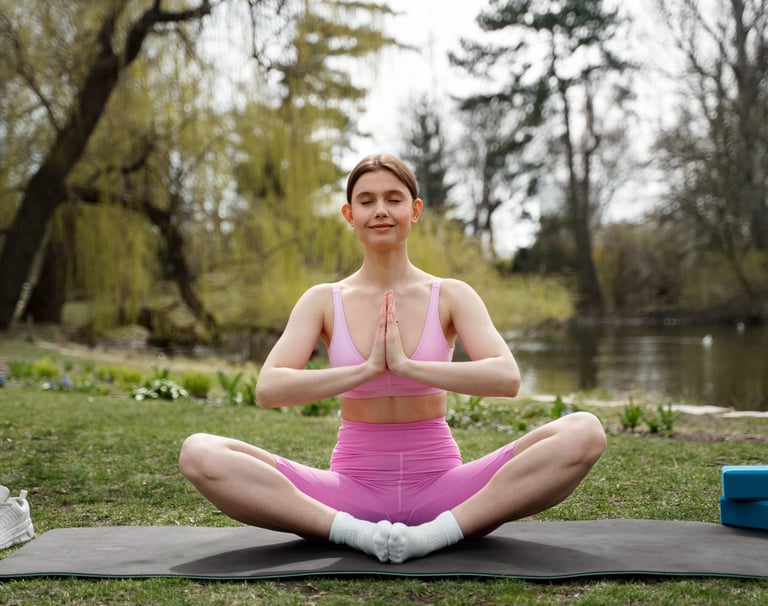How to Improve Mental Health: 10 Actionable Strategies
Everyone should prioritize their health, whether it is mental health or physical health, as both are crucial for overall well-being.


Everyone should prioritize their health, whether it is mental health or physical health, as both are crucial for overall well-being. By prioritizing them, we can enjoy a happy and contented life. Just as we take care of our physical health through eating healthy food, engaging in physical activities, and visiting the doctor when needed, we also need to focus on mental health improvement by caring for our emotional well-being, thoughts, and moods. In the following part, we will explore the fundamentals of how to improve mental health habits and develop strategies for day-to-day life to boost your overall wellness.
1. Eat a balanced Diet
Did you realize that what you eat affects how you feel? Food is not only fuel for your body; it also fuels your brain. Your brain is like the engine of your body, and the food you eat is the fuel that keeps it running smoothly. Eating healthy balanced foods gives your brain the energy to stay sharp and handle stress better.
There is a close correlation between the food you consume and your emotional health. Consumption of good fats, lean proteins, whole grain products, nuts, fresh fruits, and vegetables, which are rich in nutrients, can help enhance moods as well as the performance of the brain.
While eating healthy food it is important to avoid the consumption of highly processed foods, and sugary, and fried snacks, as they can have a damaging result on your energy level and temper. For instance, in your job, you often feel overwhelmed by long hours and deadlines. You should have proper meal plans with lots of fresh vegetables and lean proteins rather than going hungry or eating junk. This not only refreshes you in terms of the energy required to go through the day but also helps to maintain a good mood for the rest of the day.
Healthy eating for mental health isn’t about perfection—it’s about balance. Treat yourself occasionally, but try to fill most of your meals with foods that nourish your body and mind. Certain foods are especially good for brain health. For example, omega-3s found in fish like salmon, or antioxidants in berries, help protect your brain and improve your mood. On the other hand, too much processed food or sugar can leave you feeling foggy and tired.
Think of food as self-care. Preparing a colorful, balanced meal isn’t just good for your body—it’s a small act of kindness toward yourself. When you nourish yourself, you’re setting the stage for better mental well-being.
We often overlook hydration, an essential part of a balanced diet. We tend to think that a balanced diet only includes food. However, the liquids we consume also play a crucial role in keeping our bodies and brains functioning properly.
Water carries nutrients to your brain and flushes out toxins. This has a direct impact on your energy, mood, and ability to focus. Even a little dehydration can make you feel tired, unfocused, and irritable. As we all know, these things play a big role in your mental health. Just as eating healthy food is important, drinking enough water is equally essential. Think of hydration as the base that helps your balanced diet work better.


2. Lead an Active lifestyle
Living an active lifestyle acts as a natural mood booster for your brain. Whether it's a brief walk, dancing to the songs you love, or getting involved in your favorite sport, being active can help you feel less stressed, stay focused, and sleep better.
Exercise helps the brain release endorphins and serotonin, often called feel-good chemicals, which boost contentment and reduce stress. Have you ever noticed how a simple walk outside can brighten your mood? That’s your brain thanking you for moving!
Exercise should be planned throughout the day, even if it is only for ten minutes. Remember, it is not only about going to the gym. There are many other easy and enjoyable ways to stay active, like a short walk in a park, a dance lesson, a yoga class, or any activity you enjoy. However, to get the best from exercise, it's important to be consistent. You should include these activities in your routine. Some people might find these activities useless, but believe me, they make a big difference in how you feel.
The goal is to figure out something that you enjoy doing. When you want an activity, it does not feel like an effort, and you are more inclined to keep doing it. It does not require hours to be spent daily to get a positive outcome. Any amount of physical activity can help you feel happier and less stressed, and better mental health.
So, begin today with small steps, such as basic morning stretches, using the stairs instead of the elevator, or doing a 10-minute workout from home. The trick is to discover something you enjoy doing so that it seems like self-care rather than a duty. You will not feel regret, and your body and mind will be grateful for it.
3. Having a good sleep schedule
When you get a good night's rest, you wake up feeling relaxed and refreshed. Prepared to face the day. However, without enough sleep, everything feels tougher. Your mood suffers, little things irritate you, and even simple tasks can feel like a big deal.
A good sleep schedule isn’t just about getting 7-8 hours of sleep; it’s about creating a routine that works for you. Going to bed and waking up at a set time helps your body know when to rest. It’s like training your brain to switch off stress and recharge.
Have you ever noticed how a bad night’s sleep can make you more emotional? Your brain needs sleep to handle feelings and make good decisions. When you’re sleep-deprived, it’s harder to stay calm or focus on tasks.
To get better sleep, start small. Try to wind down at the same time each night—maybe with a cup of herbal tea, a warm shower, or reading something relaxing. Keep your bedroom cozy, dark, and quiet, and put your phone away before bed. Even little adaptations like these can have a big impact.
Sleep isn’t just rest—it’s self-care for your mental health. Give yourself the gift of a good night’s sleep, and you’ll feel the difference in your life.
4. Involve yourself in Social Interaction
Cultivating and maintaining relationships isn't easy—it requires effort, but the benefits for an individual's mental health are immense. Everyone needs people in their lives, whether it’s family, friends, or even a close coworker. They make our lives easier, happier, and less stressful.
Think about it. Remember when you were truly low and a quick conversation with someone helped you feel better? That’s the magic of having people who care. A quick phone call or spending time with someone who truly understands you can help cheer up the mood on a terrible day.
Another way of reducing stress and anxiety is by becoming a member of a group or a group activity like the one of desire. Similarly to conventional contacts, even online contacts may be useful in having the feeling that people are there to back one up.
When we’re lonely, though, it can feel like we’re carrying the world on our shoulders. It’s easy to overthink or feel stuck in your head. That’s why staying connected isn’t just “nice to have”—it’s important for your mental health.


Life can be very tough sometimes. Your mind becomes fixated on the daily working tasks and difficulties related to them. That is where mindfulness and meditation are useful. Well, it is almost like pausing the operations of the overactive mind and allowing the individual a chance to catch their breath.
Mindfulness means being mindful of the present moment. It doesn’t allow you to dwell on the “if only” or the “should have s” but instead helps you concentrate on the current moment. For example, pay attention to the aroma of your coffee, the sound of leaves, or how you feel sitting down. It is quite simple, but it is so effective in helping the mind relax.
Meditation takes this a step further. It is like training your mind to stay focused while remaining calm. Just five minutes a day of sitting and focusing on your breath can help alleviate stress and anxiety. It doesn’t matter if you’re not great at it; the point is to be there for yourself.
Here’s the science part: mindfulness and meditation help lower your stress hormones, like cortisol, and boost the “feel-good” chemicals in your brain. Over time, this can reduce anxiety, enhance focus, and even improve sleep quality.
You don’t need candles or a quiet mountain retreat to get started. You can simply try sitting somewhere comfortably, with your eyes closed, and take five to ten deep breaths. If your mind drifts, that’s fine – simply draw it back to your breath to take one mindful breath with complete concentration. In simple terms, it is a practice rather than a performance.
So, Mindfulness and meditation aren’t about fixing every problem in your life. They are about assisting you in achieving peace in the middle of it all. Isn't it something we all need at times?
6. Set Realistic Goals
Setting realistic goals isn’t just about finishing tasks; rather, it’s a powerful way to boost mental health, and personal achievement and improve overall well-being. Whether learning a new skill, completing a task, planning your day, or achieving even minor objectives, measurable goals can make a big difference.
If you set your goals too high or unrealistic, you might experience frustration or stress. For instance, choosing the goal “get fit in a week” might sound good, but it is quite unachievable. Instead, make it achievable, break it down into manageable steps like walking for 15 minutes every day or replacing soda with water. These goals are easier to maintain and keep you on track compared to the long-term ones.
Accomplishing personal goals will help you gain control over your life, which is crucial for mental health. Each time you achieve a goal—no matter how small—your brain produces dopamine—the “feel-good” hormone associated with pleasure. This natural mood booster enhances your confidence and helps reduce stress and anxiety.
The following is how to set goals that work.
Be specific: Replace vague goals like “I want to feel better” with clear ones like “I’ll meditate for five minutes every morning.”
Keep it realistic: Set challenging goals for yourself, but avoid making them impossible.
Celebrate small wins: Each step you accomplish builds momentum. These small successes are equally as significant as bigger ones.
Achieving goals doesn’t just help you stay organized; it significantly impacts your mental health and personal growth. By focusing on realistic goals and celebrating progress, you create a positive cycle of success, boosting your confidence and improving your mental well-being.
7. Be Grateful and Remain Positive
Gratitude is much more than just saying the magic word “thank you.” It is all about focusing on the good things in your life, even if they seem minor. Practicing gratitude daily can transform your perspective and help you see the bright side, even in the darkest times.
When you think about things you're thankful for, your brain makes chemicals like dopamine and serotonin that help you feel happy and relaxed. These chemicals naturally lift your mood and help you feel less stressed. Gratitude benefits for mental health include helping you reframe your thoughts. Instead of dwelling on what’s wrong, you start appreciating what’s right.
An easy way to begin is by keeping a journal and listing three things you’re thankful for at the end of the day. It doesn’t have to be something big—maybe a friend’s smile, a warm cup of coffee in the morning, or a peaceful evening walk. In the long run, this practice assists you in cultivating a more optimistic attitude. This is an aspect of gratitude's role in fostering a positive mindset that most people do not realize and often overlook.
Gratitude also helps build stronger relationships. Appreciation is essential because when you appreciate people it strengthens relationships and increases trust. “Thank you” can make a big difference for others and yourself.
The benefits of gratitude go beyond mental health. Research shows it can also improve physical well-being by lowering blood pressure, improving sleep, and boosting immunity. Gratitude and stress reduction go hand in hand, helping you become a happier and healthier person. By cultivating gratitude as a habit, you create a positive feedback loop that improves your mood, relationships, and overall health. Start small, stay consistent, and notice how your mindset transforms with the power of gratitude.
8. Limit Screen Time
We spend so much time on screens—browsing social media, working, or watching TV. While using screens, we often overlook that if we spend too much time sitting in front of them, our minds feel tired, stressed, and hazy. Digital detoxing is taking a break from screens. It helps you stay relaxed and pay attention more easily. Spending too much time in front of screens can harm your sleep, increase anxiety, and affect your focus. Cutting down on gadget use gives your brain a chance to rest, think more clearly, and feel less stressed. This clearly shows how screen time and mental health are closely connected.
A digital detox doesn’t mean giving up screens entirely. It’s about finding balance. Try simple steps like not taking your phone to the table during meals or not using it an hour before bedtime. These small changes can help the mind get the rest it deserves.
Even your relationships can improve when you spend less time in front of screens. Without constant notifications, you can be more attentive and present with your family. Being free from screens makes it easier to express yourself, listen to others, and truly enjoy their company. When you step away from the screen, it becomes easier to express yourself, listen to others, and simply enjoy their presence.
Yet another benefit of a digital detox is that it leads to a better mood. Social media often make us constantly compare ourselves to others, causing stress and insecurity. Stepping away from the screens allows you to focus on yourself and the things that make life truly wonderful.
Start small. Do something that does not involve a screen, go for a walk, read a book, and cook yummy food. These little steps can make big differences in your mind and mood.
Less screen time makes you feel more focused, relaxed, and in charge. It is an easy and useful approach to maintain a good psychological state and improve the quality of life.
9. Take Part in Joyful Activities
In our lives, we have so many responsibilities that we often forget to take time out for ourselves. For good mental health, it’s important to make time for yourself—and this time should be spent on things that make you feel good and bring you peace. Hobbies are a great way to make this happen. It could be like cooking your favorite meal, reading a good book, caring for your garden, listening to music, collecting stamps, or learning new skills. Such activities enable you to feel good and assist in the improvement of your creativity while at the same time making you happy.
When you’re fully focused on something you enjoy, your mind takes a break from worries and stress. Hobbies help you relax by giving you a break from your hectic routine. They let you focus on what you're doing right now, giving your mind a chance to relax and recharge.
If you do not have a hobby yet, consider what makes you cheerful. For instance, which do you like most—making things, going places, or gaining knowledge? Pick something exciting and give it a try. Keep in mind that hobbies aren’t about being productive — they’re about having fun.
Spending time on hobbies is a great investment in your mental health and shouldn’t be overlooked for the sake of other duties. They’re not just about reducing stress; they also help you discover what makes you happy and contribute to your overall well-being. Don’t forget to take time for yourself—you deserve the best!


10. Seek Assistance when Needed
There isn’t a single perfect person in the world; all of us require help at one time or the other. It’s brave to think you can handle everything on your own, but asking for help isn’t a weakness. Like if you are experiencing mental health issues don’t feel embarrassed to seek help from a mental health professional. Just like going to a doctor when you’re physically unwell, mental health counseling and therapy for mental health are here to support you.
Therapists and counselors are trained to listen to you without judging. They create a safe space to talk about your feelings and struggles. They guide you on how to cope and feel better.
Remember, your mental well-being is just as important as staying physically healthy. If things ever feel too heavy, don’t hesitate to talk to a professional. Asking for help is a brave step, and it can make a huge difference in feeling better.
Conclusion
Mental health is an essential component of living a happy and fulfilling life. So, it shouldn’t be overlooked.
We may improve our mental and emotional well-being in the same way that we care for our physical health with exercising and proper nutrition. Simple changes to our daily routines, including being active, eating a balanced diet, getting enough sleep, spending time with others, practicing mindfulness, being grateful, and remaining positive, can make a big difference.
If you have been feeling depressive symptoms, anxiety, hopelessness, or helplessness for more than two weeks and are unable to perform your common tasks, consult a mental health specialist. Spotting problems early and getting treatment can stop symptoms from getting worse and help keep your mental health strong.
It’s okay to prioritize your mental health. Taking care of it is one of the best ways to show yourself love. Start with small steps, stay consistent, and enjoy the journey to a happier and healthier life.
